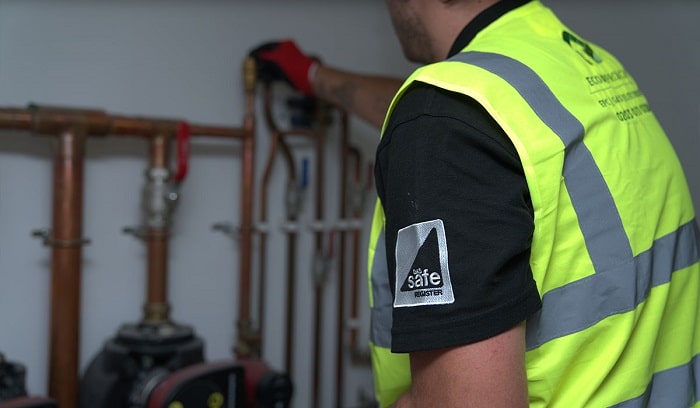The highlight of winter in the UK is the cool breeze and freezing temperatures. During the peak winter season, the average low temperature in London is 41°F (5°C), whereas it often drops even below freezing point (0°C). Apart from many other effects, the most serious of the problems homes may face is freezing of water in pipes. A frozen water pipe not only disrupts the water supply in your taps but may also cause physical damage to the pipework. A frozen pipe may burst, resulting in water leakage, which can be a challenging and inconvenient situation for a homeowner.
Additionally, it may also have a financial impact, as the repair of damaged pipe parts may involve considerable costs. The Association of British Insurers reports that insurance companies have to pay substantial insurance claims due to burst pipes, mostly during the winter season.
Although freezing of water pipes is not unusual, it can be avoided or, at the very least, the risk associated with it can be significantly reduced. Taking appropriate preparation and precautionary steps before the onset of cold weather can help avoid this trouble. On the other hand, proper knowledge is highly important in dealing with such situations.
This blog will guide you through everything you need to know about water pipe freezing, including why it occurs, how to prevent it, and, more importantly, what to do if it happens.
What Causes Pipe Freeze in Winter?
While most liquids contract as the temperature drops to 0°C, water behaves differently. Water continues to contract with a reduction in temperature, but when it reaches below 4°C, it starts expanding instead of further contracting, resulting in the formation of ice at 0°C. So, when the atmospheric temperature drops to the freezing point (0°C), the water inside the pipes converts to ice, which in fact is the expanded form of water. It exerts enormous pressure on the walls of the water pipes. Often, it happens with pipes that are directly exposed to extreme temperature fluctuations.
This extra pressure on the walls of the pipes causes them to crack or even burst if the pipe is weak or corroded. Even if the pipe is strong enough, the extreme pressure may cause cracks in it. The homes are more vulnerable to this damage, particularly when sudden temperature drops frequently occur, especially during the prolonged winter season.
The common reasons for freezing of pipes may include the following:
- Uninsulated Pipes – If the pipes in garages, basements, lofts, and outside in open areas are left uninsulated, they are highly susceptible to freezing during severe cold weather.
- Unprotected Outdoor Exposure – Water pipes and garden taps are directly exposed and unprotected against extreme weather conditions; hence, they may freeze quickly when the temperature suddenly drops.
- Unheated Parts of the Home – Water pipes may also freeze if installed in areas of the home that do not receive sufficient heating.
- Less Usage of Water – Water also freezes if its flow or usage is significantly less. It also occurs when residents are away for an extended period.
Act fast if your pipes freeze—get expert help before damage sets in.
How to Avoid Freezing of Pipes?

The first step in protecting your water pipes from extreme cold is to understand what causes your pipes to freeze. Once you have identified the causes, it becomes easy for you to avoid them from happening:
- Ensure Perfect Insulation of Pipes – Lagging, technically known as insulating the pipes, is the first defense against freezing. Foam tubes are readily available in stores, in different sizes that easily fit over pipes. Insulation of pipes in lofts, crawl spaces, and garages is the first priority. Garden pipes and outdoor taps should also be insulated properly. The third place that needs more attention is the pipes that run along the external walls. The added benefit of perfect insulation is that it also helps retain the heat, which may have a positive impact on energy bills.
- Open Loft Hatches and Cupboards – Pipes that are under sinks, in cupboards, and in lofts are more vulnerable to freezing because they do not get ample warm air circulation. Open the cupboard doors of the kitchen and bathrooms, as well as loft hatches, to allow warm air to circulate and reach vulnerable pipes.
- Maintain Heating at Lower Temperature – It is highly advisable to maintain a lower temperature, somewhere between 12 and 15°C. Doing this will facilitate the circulation of warm air throughout the home, reducing the possibility of pipes freezing. While going out for holidays or for any other purpose during extreme winter, the best option is not to shut down the heating system. It is better to leave it operational on a low setting. An alternate option might be to drain out the water from the entire system. It is more useful when you plan to go away for a prolonged duration.
- Take Care of Outdoor Taps – If possible, disconnect the water supply to outdoor taps and pipes. Similarly, the outdoor taps may be protected with an insulated tap cover. Another precaution might be to drain garden hoses and keep them indoors during the severe winter season.
- Check out the Home Insulation - A well-insulated home not only reduces the energy bills but also reduces the risk of freezing of water pipes. Review your home’s insulation well before the onset of winter and improve it where necessary.
- Keep the System Running – The chances of freezing of water are far less if it keeps flowing. If possible, ensure that water in the entire system continues to flow most of the time. This can be done by slightly opening some of the water taps for a short period, especially when water is not being used in the kitchen or bathrooms. By doing so, warm water replaces the cold water, thus reducing the risk of freezing.
How to Detect Frozen Pipes?
- If there is no water coming out from the taps, there is every possibility that the pipes supplying water to that tap are frozen.
- If an abnormal smell is coming out from the sinks or drains, it is another sign that there might be a case of frozen pipes somewhere in the system.
- Ice forming on exposed pipes is a clear sign that some of the pipes are already frozen.
- Expanding ice, formed inside a pipe, may cause it to swell. This is yet another clear sign of pipe freezing. If left unattended, these pipes are most likely to burst soon.
Frozen Pipes Detected – What to Do Now?
If a frozen pipe is detected anywhere in the home, it needs instant action to avoid further damage. A stepwise action plan is summarized here:
- Turn Off the Water Supply: Immediately turn off the water supply valve to the affected pipes. This will prevent water from flowing, thereby reducing the likelihood of flooding in the event of a frozen pipe.
- Shut down the Heating System: The next step is to turn off the central heating system. It includes turning off the boiler and cutting the gas supply to the heating system.
- Identify Which Pipes are Frozen: Inspect the pipes, which are exposed to the outdoors, as they are more likely to be affected by cold weather. Physical inspection may be helpful to find out which ones have been frozen. The pipes, which are abnormally cold, are swollen, and frost can be seen over them; they might be the ones that are frozen.
- Try to Warm the Frozen Pipe: If possible and can be done without any risk, try to warm the affected pipes. Avoid doing so with direct flame; instead, try it by wrapping it with hot towels, soaked in warm water. Using hot water bottles and hair dryers may also help. Another way is to warm the area where pipes are affected, using portable heaters. Always warm the pipes slowly to avoid cracks or bursts.
- Check for Cracks: Once the affected pipes have been sufficiently warmed, slowly turn on the water supply and minutely inspect to check for cracks that might have occurred. This can be identified by checking whether there is any water leakage.
- Check if a Pipe is Burst: Check if there is a burst pipe. If so, it is an emergency situation and requires an urgent solution.
Follow these steps to control the situation:
- Disconnect the water supply to the affected pipe immediately.
- Turn off the electricity in the affected area, especially when leaking water is near the electrical appliances or sockets.
- Open all the taps so that the remaining water is completely drained out.
- Call a professional plumber to replace the affected pipe and fix the problem.
- If the quantum of the damage is higher, contact your home insurance provider to lodge an insurance claim.
Stay ahead of winter problems—book a professional pipe inspection now.
Conclusion
Freezing of water pipes is a common occurrence; it often happens in homes located in cold areas during the winter season. Such an event may occur at any time, especially when there is a sudden or unexpected drop in temperature. The freezing of pipes cannot be completely prevented, but by adopting some precautionary measures, the likelihood of freezing can be minimized.
More importantly, the damage can also be minimized if the homeowners are well-trained to handle the situation. As a first step, it is essential to ensure that the home and exposed pipes are properly insulated before the onset of winter. Secondly, a physical review of the entire pipework before the start of winter also helps identify any vulnerable pipes. Once identified, the problem must be immediately fixed. If it happens at all, pipe freezing requires a prompt response from homeowners. A timely and accurate response can minimize damage and financial loss.

